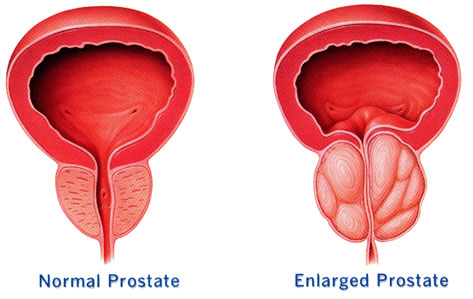New Hope Unlimited has found that many times symptoms may be improved and possibly reversed with our Alternative Prostate Cancer treatment.
Prostate cancer is one of the common cancers affecting Americans. The disease occurs when cells in the prostate gland grow abnormally.
Prostate glands are unique to males and responsible for generating some of the fluid in the semen. It is about the size of a walnut, but it may grow bigger in size as a male person age. It is located near the urethra and the bladder.
In 2016, it is estimated that there will be approximately 180,890 new cases of prostate cancer and about 26,120 will die from the disease. The average age of diagnosis is age 66. Sixty percent of cases are detected in men who are 65 years old and above.
Prostate cancers have different types but the most common is adenocarcinoma, which accounts for a majority of prostate cancer cases. Adenocarcinomas develop directly from the gland cells.
A small portion of prostate cancer cases are rare types, and some of them include:
● Sarcomas – begins from the muscle
● Small cell center – a kind of neuroendocrine tumor comprised of small round cells. It is harder to detect early because those who have it may not test positive for high prostate-specific antigen (PSA) levels.
● Transitional cell carcinomas – begins in the urethra or the bladder
● Squamous cell cancer – begins in the cells covering the prostate gland
Symptoms
During the early stage of prostate cancer, it typically shows no signs. But as the disease advances, it can manifest the following symptoms.
● Difficulty with urinating whether in stopping or starting it
● Frequent need to urinate especially at night
● Pain when urinating
● A feeling that you were unable to empty the bladder after urinating
● Blood in the urine or semen
● Erectile dysfunction
● Hip, back, and chest pain
● Loss of bladder or bowel control
● Numbness in the legs or feet
● Pain when ejaculating
● Unexplained weight loss
● Fatigue
● Nausea
● Vomiting
● Paralysis of the lower limbs that comes with constipation
Risk Factors
Statistics show that one in seven men will have prostate cancer in his lifetime. But what exactly affects a man’s risk for incurring the disease? Let’s look at the factors.
● Age – Prostate cancer is more prevalent in older men. A person’s chances of developing the disease increase with age, especially after hitting the 50-year-old mark. As mentioned, more than half of prostate cancer cases are diagnosed after age 65.
● Family health history – Men who have a father or brother with prostate cancer are at an increased risk. The same can be said for men with relatives who had the disease, especially when diagnosed at a young age. Besides, gene changes can also be inherited.
● Race – Prostate cancer is common among African-American men. They are also more prone to incur a type of prostate cancer that grows and metastasizes to other organs.
Different researches have unclear findings with regards to the relationship of prostate cancer with diet, obesity, smoking, chemical exposure, sexually transmitted disease, and chemical exposure. More studies are underway to come up with a more concrete link between prostate cancer and the factors mentioned.
Prevention
There’s no exact and definite way to prevent prostate cancer. But while risk factors are mostly beyond your control, you can still strive to make healthy lifestyle choices to lessen your chances of developing the condition.
It’s still undetermined if diet, weight, and lifestyle have a direct link with a person’s risk of prostate cancer, but it still pays to eat a healthy diet and maintain an ideal weight. Because research findings are not yet definitive, it’s best to seek advice from a doctor about the appropriate diet and fitness plan for you.
Diagnostic Tests for Detection
Prostate cancer can be detected or diagnosed through different procedures, and these are:
Prostate-Specific Antigen (PSA) Blood Test
PSA blood test is done to detect the PSA levels in the blood. High PSA levels may indicate an enlargement, infection, or cancer in the prostate. Depending on the result, a doctor may advise further observation or biopsy.
Digital Rectal Exam (DRE)
The digital rectal exam is done to detect any bumps, hard areas, or growth on the prostate that may be cancer. It is performed through the insertion of a lubricated and gloved finger in the rectum. A patient may feel slight discomfort during the examination, but the procedure is generally not painful and will only last for a short while.
Transrectal Ultrasound
Transrectal Ultrasound is the process of inserting a probe in the rectum to generate an image of the prostate through sound waves.
Biopsy
The biopsy is the process of taking tissue from the prostate and examining it under a microscope. Of all the procedures mentioned, this is the only way to know for sure if a man has prostate cancer or not.
Being diagnosed with prostate cancer is not a death sentence. While it can be a fatal condition, know that there’s hope and that you have a choice. New Hope Unlimited will help you continue living a full life while battling the disease. Please get in touch with our care team to explore different prostate cancer treatment options.
Glossary
● Erectile dysfunction – the inability to have an erection or maintain it during sexual activity
● Metastasize – to spread to other parts of the body
● Prostate-Specific Antigen (PSA) – a substance created by cells, both normal and cancer cells, in the prostate gland
● Rectum – is a part of the digestive system that’s located in the lower section of the large intestine.




